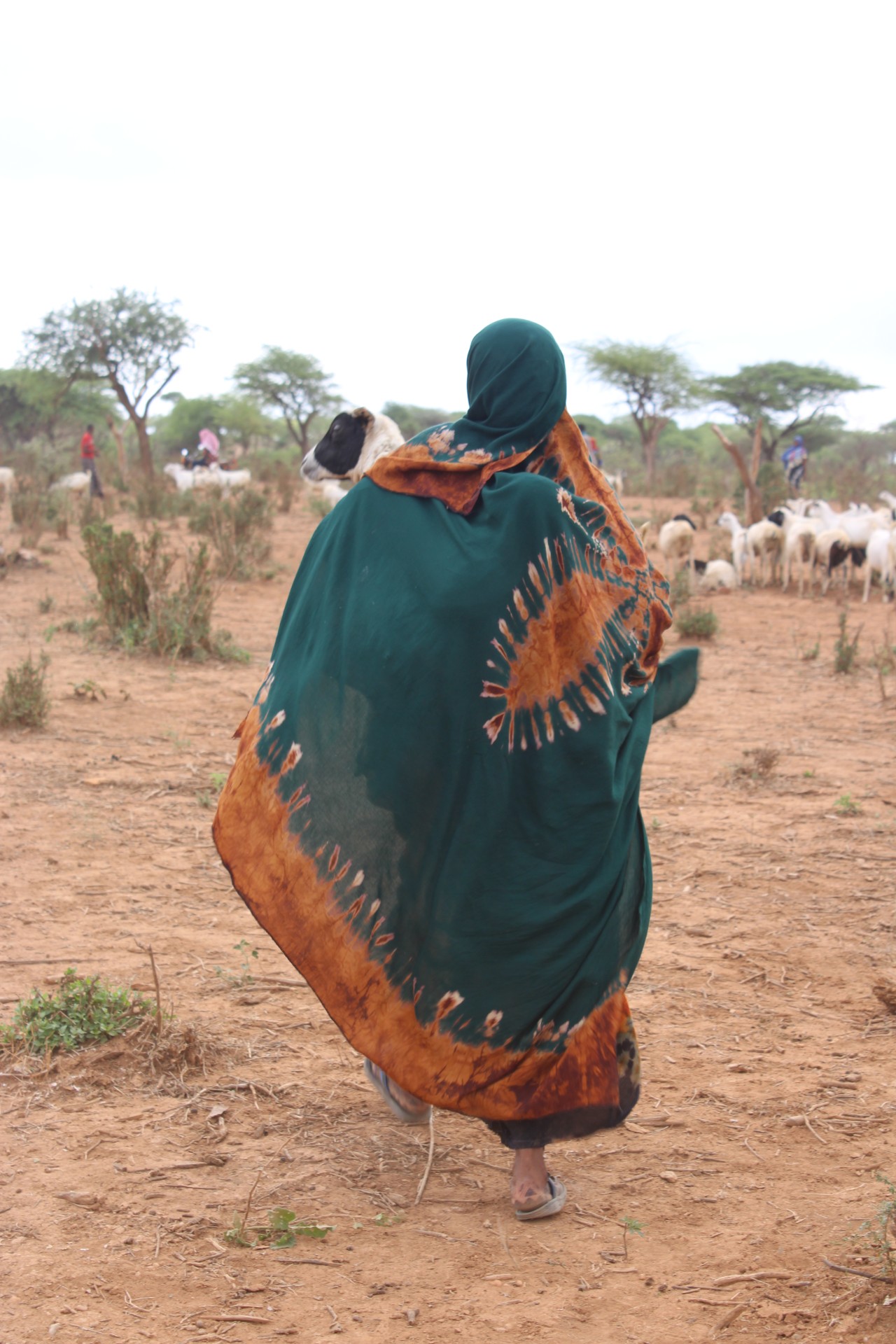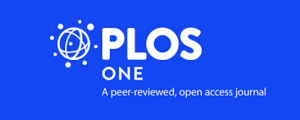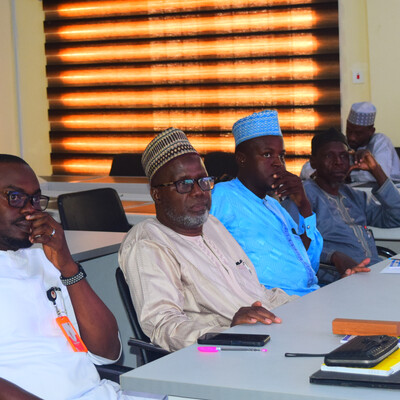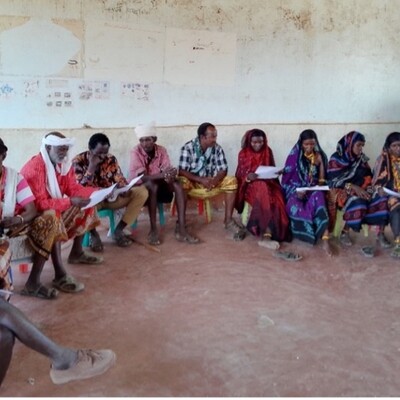

What are livestock to pastoralists? An anthropological reflection
When discussing the value of livestock, the literature often emphasizes economic and food-related benefits. However, livestock mean much more, particularly for pastoralists. Beyond their economic value, there are less visible but deeply profound meanings tied to these animals. As part of my PhD studies at the University of Glasgow and hosted by the One Health for Humans, Environment, Animals and Livelihoods (HEAL) project at the International Livestock Research Institute (ILRI), I am using anthropological methods to gain insight into the connections pastoralists share with their livestock, and the complexities of human-animal-environment relationships, through the lenses of gender and climate change.
'My animals are my life'
During prolonged months of my fieldwork in Filtu District in the Somali region of Ethiopia, I had the chance to live among and speak with many pastoralists who, like other pastoralists worldwide, rely on their livestock for survival and know no other way of life.
As one pastoralist said, ‘My animals are my life, my everything.’

The relationship between pastoralists and their livestock runs deep; they are considered part of the family. Mobility is essential for these herders, as they constantly move to ensure their animals have access to pasture and water, are safe from wild animals and do not wander off. Often, pastoralists face difficult choices: to stay with their families or take the livestock grazing for several days, missing social events and leaving their families unprotected. Participants shared stories of going out late at night in search of pasture when their animals needed more. They would risk their own lives for their livestock.
During periods of drought, livestock become the central focus for decision-making among pastoralists, as the survival of the animals is prioritized for the community’s greater benefit. Livestock dictate mobility plans and daily routines. In one of my discussions, a woman shared how she had to split the small amount of milk she was getting from a goat between her infant son and a baby goat that had lost its mother to the drought. Her deep care for both—the child and the animal—reflected a mother's love for her family and her livestock. In this community, losing an animal is likened to losing a child, and it is one of the stories they share with heavy hearts.
Previous research has often neglected the emotional dimensions of pastoralists' relationships with their livestock, despite their significance for well-being. From my observations and interviews, this bond intensifies during periods of climate variability, as livestock suffer due to droughts, floods or disease. Loss of livestock triggers profound grief, comparable to mourning a family member. While suicide is rare, many, particularly men, experience significant stress, anxiety and a loss of identity, struggling to cope due to the deep connection and dependency they have with their animals.
The loss of livestock disrupts the traditional role of men as providers and decision-makers. In times of crisis, such as during a drought, men may adopt coping strategies like selling off their remaining livestock and migrating to urban areas. However, the community often views this as abandonment of family and responsibilities, leading to perceptions of failure or weakness. Men in these areas experience mental distress as a direct consequence of livestock loss, significantly affecting their mental wellbeing. This distress is often noticeable and becomes a shared concern within the community. Some men fall into deep depression, stop caring for themselves, experience sleeplessness and even call out to their lost livestock by name, asking others if they have seen them.
On the other hand, women in these areas develop mental distress during periods of climate variability due to challenges like increased responsibilities, resource scarcity and pressures tied to sustaining their households and livestock. These stressors are often compounded by societal expectations and their caregiving roles, making their experiences of mental distress distinct from those of men. The inability to provide milk for their children, the necessity to fetch water themselves when the donkey is too weak or dead and the responsibility of caring for orphaned baby animals—all while managing five to six young children of their own—drains women both physically and mentally. Women carry the emotional and physical strain of keeping their families and remaining livestock alive, making their role within the household even more challenging during these crisis periods.
In Filtu, camels hold great significance in particular, symbolizing wealth, social status and resilience. A man who owns a large herd of camels is respected and considered wise within the community. Camels are seen as a blessing from Allah, and their importance is highlighted in the Quran, where Allah is said to have taken special care in creating them. Camels, known for their intelligence, obedience and resistance to disease, elevate the status of their owner, typically a man.
There is a famous saying in Somali communties that reflects a man's authority over camels compared to a woman's: ‘A camel turns its head for only two things—when it sees a man or when it senses a threat.’
I did not hear a lot of stories about camel and women; but I heard about small ruminants and women. It was interesting to learn that almost all the livestock have names, often given by the women in the family shortly after the animals were born. Names are usually based on the animal’s characteristics or colour. Each animal is believed to have its own personality, and the livestock recognize their names and the unique tone of their owner's voice. Women sing to the livestock while milking them, calling them by name—a practice believed to help the animals produce more milk. This reflects the deep emotional bond pastoralists have with their livestock, which goes far beyond economic value.
Pastoralists in Filtu also recognize the importance of a favourable climate and expressed its positive impact on their mental wellbeing and overall wellbeing of their animals. Most respondents emphasized that adequate rain and pasture are more valuable than anything else they could ask for. They also expressed concerns about the extreme heat, not only for their livestock but also for themselves, highlighting the lack of adequate shade for resting during travel breaks.
Climate change can darken mental health
A recent study I was involved with provided a broader overview of the effects of climate change on mental health. It highlighted that for people whose livelihoods are deeply interwoven with livestock and the environment, the impact of climate change extends beyond economic concerns. The loss of places and cultural practices that are central to their sense of self and identity can lead to feelings of loneliness and isolation, which, in turn, affect their socio-economic stability.
Livestock embody more than just physical resources in pastoralist societies—they carry deep cultural, social and emotional meaning which impact on human mental wellbeing. For pastoralists living in a country such as Ethiopia, livestock are seen as integral family members, deeply knotted with their daily lives and identities. The connection pastoralists have with their animals reveals a profound bond shaped by care, survival, resilience, wellbeing and the shared challenges of an increasingly harsh environment.
In settings where both people and livestock are deeply affected by climate variability, it is important to put into consideration the emotional bond between pastoralists and their livestock. One Health interventions should recognize that poor mental wellbeing in these communities can result from the loss of livestock and that the experience is shaped by gender, religion, culture and other intersecting issues.
Further reading
You may also like

ILRI News
Empowering every voice: Participatory GIS can transform resource management and gender inclusion. Case story of Isiolo County, Kenya

ILRI News
How much carbon can Kenyan grasslands store in their soils? Insights from the CarboGrass Project

ILRI News
Beyond smartphones: How citizen volunteers are supporting the drylands livestock market intelligence platform KAZNET in Kenya
Related Publications

Perceived impacts of climate change in pastoralist regions of Ethiopia: A qualitative study applying the concept of One Health
- Tamire, M.
- Mor, Siobhan M.
- Baylis, M.
- Kaba, M.

“Without a man’s decision, nothing works”: Building resilience to Rift Valley fever in pastoralist communities in Isiolo Kenya
- Mutambo, Irene N.
- Bett, Bernard K.
- Bukachi, S.A.

A review of approaches to the integration of humanitarian and development aid: the case of drought management in the Horn of Africa
- Mohamed, Tahira Shariff
- Crane, Todd A.
- Derbyshire, Samuel F.
- Roba, Guyo Malicha

Impact of index insurance on downside income risk: Evidence from northern Kenya
- Shikuku, Kelvin Mashisia
- Ochenje, Ibrahim

Bundled solutions for climate adaptation: A multi-method participatory approach to address socially differentiated needs and preferences for complementing livestock insurance with other services among pastoral communities in northern Kenya
- DuttaGupta, Tanaya
- Banerjee, Rupsha R.
- Shikuku, Kelvin Mashisia
- Masakhwe, Sonia
- Galgallo, Diba
- Malicha, Wario
- Ochenje, Ibrahim
- Osiemo, Jamleck











